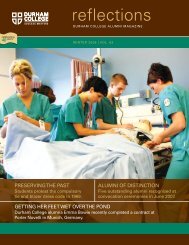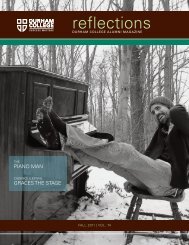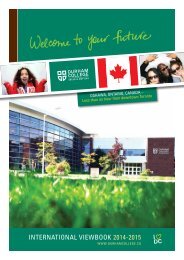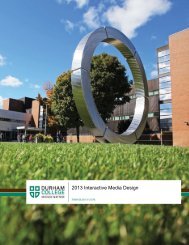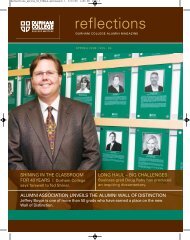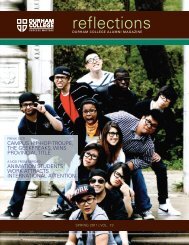Fall 2006 - Durham College
Fall 2006 - Durham College
Fall 2006 - Durham College
Create successful ePaper yourself
Turn your PDF publications into a flip-book with our unique Google optimized e-Paper software.
REAL-LIFE<br />
CSI<br />
DR. SHARI FORBES CAME ALL THE WAY<br />
FROM AUSTRALIA TO BRING FORENSIC<br />
SCIENCE TO UOIT.<br />
by MELISSA BAVARO<br />
PHOTO BY CHRIS R. O’BRIEN<br />
The evidence supports the facts –<br />
especially in the case of Dr. Shari Forbes,<br />
who was born to be in the forensic field.<br />
After being involved in lab analysis and<br />
casework, Forbes has travelled all the<br />
way from Australia to head up a forensic<br />
program at the University of Ontario<br />
Institute of Technology (UOIT).<br />
“We’re thrilled to have been able to<br />
attract Dr. Shari Forbes to join the UOIT<br />
Faculty of Science,” said William Smith,<br />
dean of Science at UOIT. “Shari is a<br />
world-class researcher in forensic<br />
chemistry. She will be a leader in the<br />
delivery of our innovative Forensic<br />
Science undergraduate program, and<br />
in contributing to the already strong<br />
interdisciplinary research activities in<br />
our faculty.”<br />
Way before the hit TV series CSI was<br />
around, when forensics was something<br />
that almost nobody knew about, Dr.<br />
Forbes decided to enter the field. She<br />
always enjoyed science and found<br />
forensics fascinating, but the main<br />
reason for getting into forensics was<br />
the same reason why Dr. Forbes thinks<br />
most students enter the program today.<br />
“You can see the application of it. You<br />
can tell right away how you are helping<br />
society with the science,” said Dr. Forbes.<br />
“Forensic subjects are always interesting<br />
whether the teacher tries to make it that<br />
way or not. You can always refer to<br />
something that was seen on the television<br />
news, or a website.”<br />
Dr. Forbes entered the academic field<br />
of forensics so that she could research<br />
while teaching. She decided to move<br />
to Canada because she believes that<br />
overseas experience helps and broadens<br />
perspectives.<br />
“I’ve done casework in Australia, but<br />
I’d like to be well recognized within the<br />
forensic community in Canada so they<br />
know they can ask me for help as well,”<br />
she said.<br />
While teaching at UOIT, Forbes has been<br />
using biology and chemistry to conduct<br />
research on decomposition. Her research<br />
consists of looking at how bodies decompose<br />
in burial environments and specifically<br />
focuses on decomposition chemistry,<br />
which is essentially the processes that<br />
result in a body decomposing. At the<br />
moment, her research is focused more on<br />
forensic graves but Dr. Forbes hopes to<br />
expand this to mass graves internationally<br />
one day.<br />
“I do decomposition research which is<br />
very rare, there aren’t many of us out there,”<br />
she said. “Decomposition is challenging<br />
research to get used to. Sometimes you<br />
have to see stuff you don’t want to see<br />
and you get desensitized quite a bit. But<br />
at the end of the day that’s what you do<br />
and that’s your job. There’s a means to an<br />
end if you can catch someone and put<br />
them behind bars.”<br />
Even with the many challenging aspects<br />
within the forensic field, Dr. Forbes loves<br />
the fact that there is always something<br />
new arising.<br />
“Because it’s so new it’ll be years<br />
before it becomes an established field.<br />
Right now there are fingerprints, DNA,<br />
hair and fibres,” said Forbes. “There will<br />
always be something new coming up,<br />
even when it is an established discipline.”<br />
Although forensic science has drawn<br />
lots of interest because of shows like CSI,<br />
television doesn’t offer a great depiction<br />
of what the field is really like. Dr. Forbes<br />
believes that CSI has been great for<br />
introducing the unknown science but feels<br />
it gives the impression that everything is<br />
done by one person who goes and collects<br />
samples, analyzes them in the labs, and<br />
makes an arrest. In reality, cases go on<br />
for years and years, and a huge range of<br />
people are doing those jobs.<br />
Unlike the new wave of forensic fans<br />
who are tuning into CSI every week, Dr.<br />
Forbes doesn’t need to watch the show<br />
because it’s all real life for her.<br />
“I’ve only ever seen it once and that’s all<br />
I could handle,” she said. “I do that work<br />
all day long. I’m sure it’s the same thing<br />
with doctors watching ER.”<br />
WWW.DURHAMCOLLEGE.CA REFLECTIONS | FALL <strong>2006</strong> 13



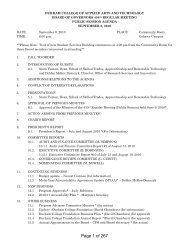

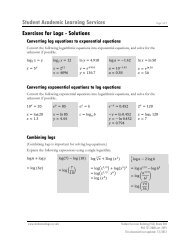
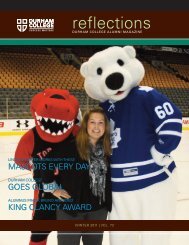

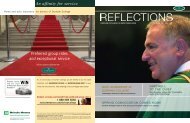
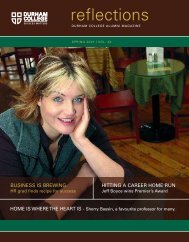
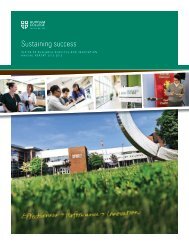
![Annual Report 2007 – 2008 [PDF - 942 KB] - Durham College](https://img.yumpu.com/46399542/1/190x245/annual-report-2007-2008-pdf-942-kb-durham-college.jpg?quality=85)
